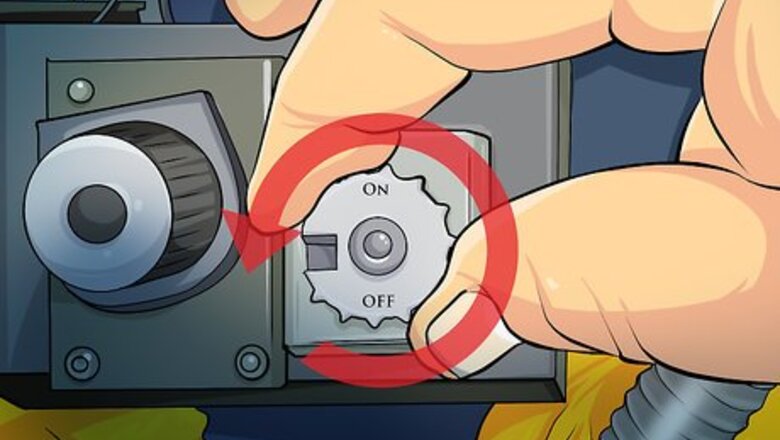
views
Cleaning the Individual Pieces
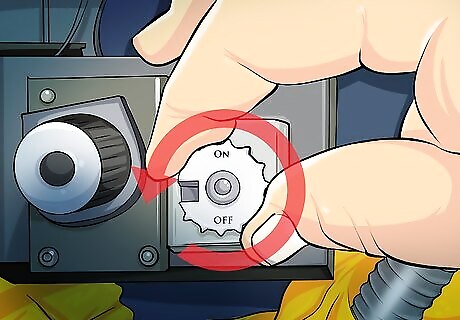
Turn the gas off. Before you begin cleaning your gas fireplace, you must first make sure you turn the gas valve to the “off” position. If you leave the gas running, it could cause a dangerous gas leak in your house. The gas valve is typically on the wall next to the fireplace. Allow a few minutes for all the gas to leave the piping in the fireplace. You also need to wait until all of the gas fireplace components are cool before you begin the cleaning process.
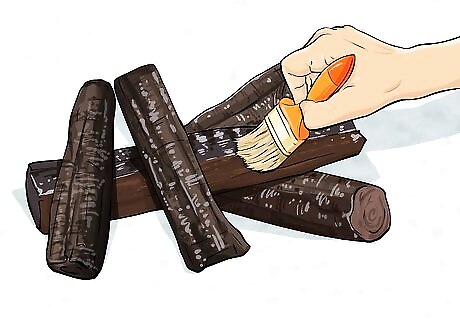
Brush off the gas logs. Remove the gas logs from the fireplace and take them outside for cleaning. Use a soft paintbrush to brush away any dirt or debris from the logs. Be gentle with your brushing because you don't want to damage the fragile logs. Be sure to check each log for signs of corrosion — things like cracking, splitting, or burn holes — before returning them to the fireplace for use again. When you replace the logs, put them back exactly as they were. Don't rearrange them. The logs are designed and situated in a certain way to produce the best results.
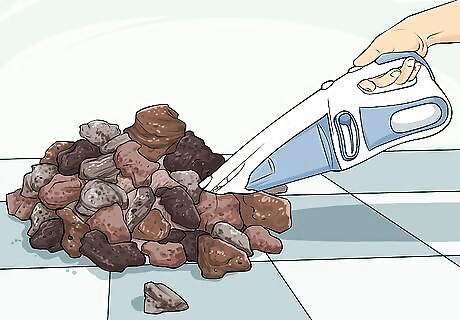
Vacuum the lava rocks. Remove each lava rock from the gas fireplace and place them on an old towel. Use a vacuum cleaner with a hose attachment to go over each lava rock individually. This should suck up any loose dirt or grime that has settled on the rocks. If some of your lava rocks are too small to be vacuumed without getting sucked up in the machine, put a piece of cheesecloth over the nozzle of the vacuum cleaner and secure it with a rubber band. You can also use the vacuum hose to clean up around the vent of the heat exchanger. Use a soft-bristled brush to clean up any soot build-up.
Cleaning the Fireplace
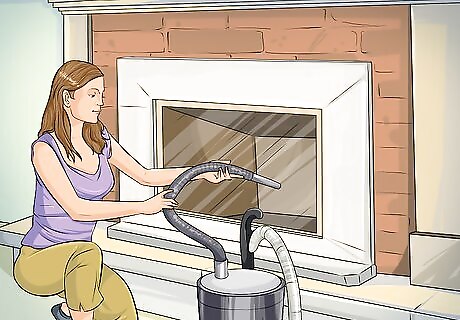
Clean the interior. Use a vacuum cleaner with a hose attachment to clean up the inside of the fireplace. Stick the hose attachment into the interior and turn the vacuum cleaner on. Look specifically for spider webs and other dust bunnies that you can clean up with the vacuum cleaner. This will help you remove any dust or debris from the inside. Wrap the vacuum hose with old rags and duct tape so it doesn't get blackened and dirty.
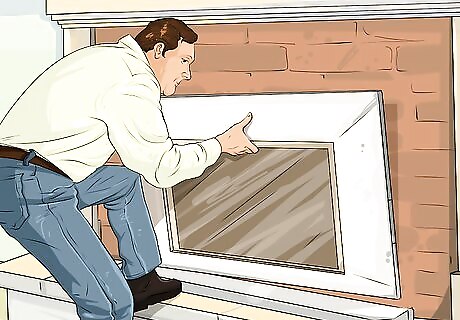
Clean the glass covering. Use fireplace glass cleaner to clean the glass covering of your gas fireplace. Spray the cleaner on a dry cloth and rub it in a circular motion on the glass. If the glass has a lot of dirt and grime on it, spray the cleaner directly on the glass and rub it off using newspaper. Once you have achieved the desired results, let the glass dry completely before you start another fire. You can purchase fireplace glass cleaner at any home improvement store. You should not use regular glass cleaner like Windex for this task, as the ingredients in these kinds of cleaners can have adverse reactions to the carbon deposits that accumulate on the fireplace glass.
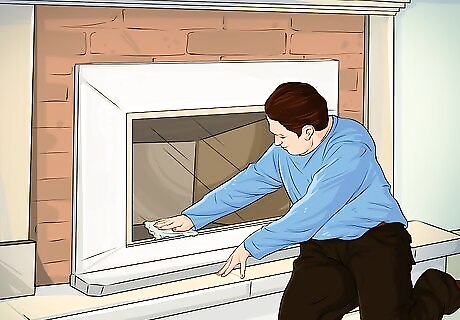
Wipe down the inside edges with a damp cloth. Use a clean, damp cloth to wipe away any excess soot or dirt that has accumulated over time. After each wipe, be sure to rinse out the cloth in warm water to keep it clean. Only use water to wipe down the inside of the gas fireplace. You don't want to use a cleaner with harsh chemicals in it that could react badly with the heat from the fireplace.
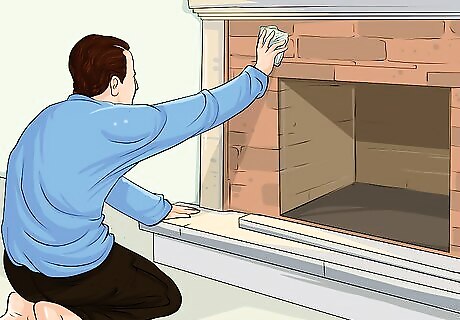
Clean the exterior. Take a soft cloth and dampen it with warm water. Use the cloth to wipe down the exterior framework of your gas fireplace. Make sure you continuously rinse out the cloth to remove any soot or dirt so that you don't just keep reapplying it to the fireplace. Regardless of the material – marble, brass, gold, stone, etc. – water should work well enough to clean the exterior of your fireplace if you clean it regularly.

Use mild dish soap on tough buildup. If you need something stronger because there is a buildup of dust or soot, try using mild liquid dish soap. Pour a small amount of the liquid dish soap into a bowl of warm water and mix it together until it is sudsy. Use a soft cloth dipped in the soapy water to gently wipe away any grime that has formed on the exterior.
Preventing Damage
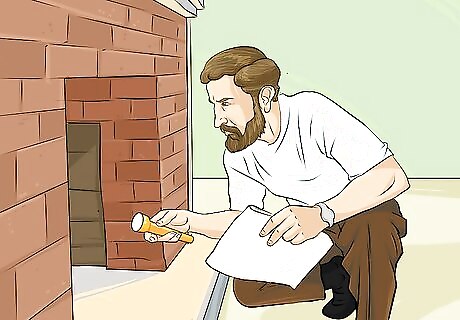
Inspect for damage regularly. In order to make sure your gas fireplace keeps working properly for years to come, you'll need to inspect all of the pieces on a regular basis. Take a look at the gasket to make sure it isn't cracked or broken. You should also check the outside vent for the gas fireplace for any debris that could cause a problem. Leaves and animal nests often become problematic in outdoor fireplace vents.

Follow all care instructions in the owner's manual. Your owner's manual will provide you with detailed instructions on how to clean and care for your gas fireplace. It's important that you follow these guidelines even when practicing at-home care and maintenance yourself. If you don't follow the instructions in the owner's manual, it's possible that you could void the manufacturer's warranty.
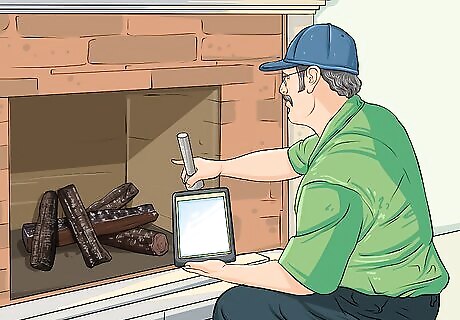
Get your fireplace inspected annually. Gas fireplaces should be inspected by a trained professional once every year. This will help ensure that your gas fireplace is functioning properly and that there is no potential for damage or harm. An inspector will look at all the pieces – including the logs and the lava rocks – to make sure all of the pieces are in proper working order. They'll also be able to tell you if there are any leaks in the piping and whether or not the pressurization levels are accurate. Most general handymen or home repair service people should be qualified to inspect fireplaces, but an HVAC specialist would be the best option.














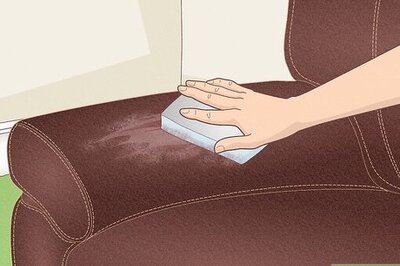


Comments
0 comment